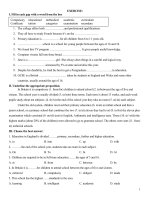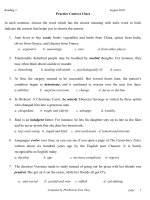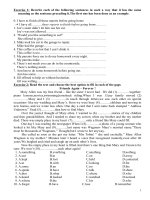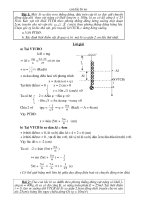bài tập từ vựng 12
Bạn đang xem bản rút gọn của tài liệu. Xem và tải ngay bản đầy đủ của tài liệu tại đây (61.53 KB, 2 trang )
EXERCISE:
I. Fill in each gap with a word from the box
1. The college offers both ………………..and professional qualifications.
2. They all have to study French because it’s on the ……………………
3. Primary education is ………………for all children from 6 to 11 years old.
4. ……………………. school is a school for young people between the ages of 16 and 18.
5. We found this TV program …………………………... It gives people useful knowledge.
6. Computer viruses fall into three broad …………………………
7. Jane is a ………………………. girl. She always does things in a careful and logical way.
8. ………………………..increased by 5% at state universities this year.
9. Despite his disability, he tried his best to get a Postgraduate ……………………..in education.
10. GCSE is a British ………………………. taken by students in England and Wales and some other
countries, usually around the age of 16.
II. Underline the appropriate preposition.
In Britain it is compulsory (1. from/for) children to attend school (2. to/between) the age of five and
sixteen. The school year is usually divided (3. to/into) three terms. Each term is about 13 weeks, and each week
pupils study about ten subjects. (4. In/At) the end of the school year they take an exam (5. on/in) each subject.
Under the old system, children received their primary education (6. to/at) an infant school and then a
junior school, or a primary school that combines the two (7. to/at) eleven they had to sit (8. to/for) the eleven plus
examination which consisted (9. on/of) tests in English, Arithmetic and intelligence tests. Those (10. to/ with) the
highest marks (about 20% of the children) were allowed to go to grammar school. The others were sent (11. from/
to) technical schools.
III. Choose the best answer:
1. Education in England is divided………primary, secondary, further and higher education.
A. in B. into C. up D. with
2. ……….the end of the school year, students take an exam in each subject.
A. On B. To C. In D. At
3. Children are required to be in full-time education……..the ages of 5 and 16.
A. at B. from C. between D. by
4. In Britain it is………for children to attend school between the ages of five and sixteen.
A. enforced B. compulsory C. obliged D. made
5. This school has the highest……standards in the area.
A. learning B. intelligent C. academic D. study
1
Compulsory educational methodical academic curriculum
Certificate tuition categories examination secondary
6. We acquire much of our world knowledge through……….
A. education B. graduation C. condition D. examination
7. English students usually……their GCSEs at the age of sixteen.
A. pass B. make C. take D. follow
8. By the age of twenty-five he had………his ambition of becoming a pianist.
A. reached B. completed C. obtained D. achieved
9. You can study a lot of interesting…….such as Design & Technology, Architecture, Psychology, and Politics at
this university.
A. curriculum B. subjects C. schedules D. syllabus
10. The academic year in England runs from September to July and is divided in three……….
A. terms B. semesters C. seminars D. systems
IV. Choose the best answer:
1. If it……….tomorrow, I will not have to water the garden.
A. will rain B. is raining C. rained D. rains
2. Had I known his address, I ………… before.
A. would write B. have written C. had written D. would have written
3. Supposing I ……….to agree to your request, how do you think the other students would feel?
A. would B. am C. were D. could
4. ……….already busy in August, I would gladly accept your invitation.
A. Was I not B. Were I not C. If I am not D. Unless I was not
5. If she……….rich, she would travel around the world.
A. would be B. is C. had been D. were
6. I would appreciate it………what I have told you a secret.
A. you can keep B. that you kept C. you will keep D. if you kept
7. George wouldn’t have met Mary…..to his brother’s graduation party.
A. if he has not gone B. if he should not have gone C. hadn’t he gone D. had he not gone
8. If you had taken my advice, you…….in such difficulties now.
A. won’t be B. hadn’t been C. wouldn’t be D. wouldn’t have been
9. The minister has a talent for talking to ordinary people as if they……….her equals.
A. are B. were C. be D. had been
10. If it………more humid in the desert of the Southwest, the hot temperatures would be unbearable.
A. is B. were C. would be D. had been
11. If he hadn’t shown such a blatant disregard for company regulations by smoking while on duty, he……
A. wouldn’t dismiss B. wouldn’t be dismissed
C. wouldn’t have dismissed D. wouldn’t have been dismissed
12. He behaved as if nothing……..
A. has happened B. would happen C. had happened D. was happening
13. ……..you at he station if you’d told me you were coming today.
A. I’d met B. I’d have met C. I met D. I’d meet
14. If only he…….us the truth in the first place, things wouldn’t have gone so wrong.
A. told B. have told C. had told D. would have told
2









